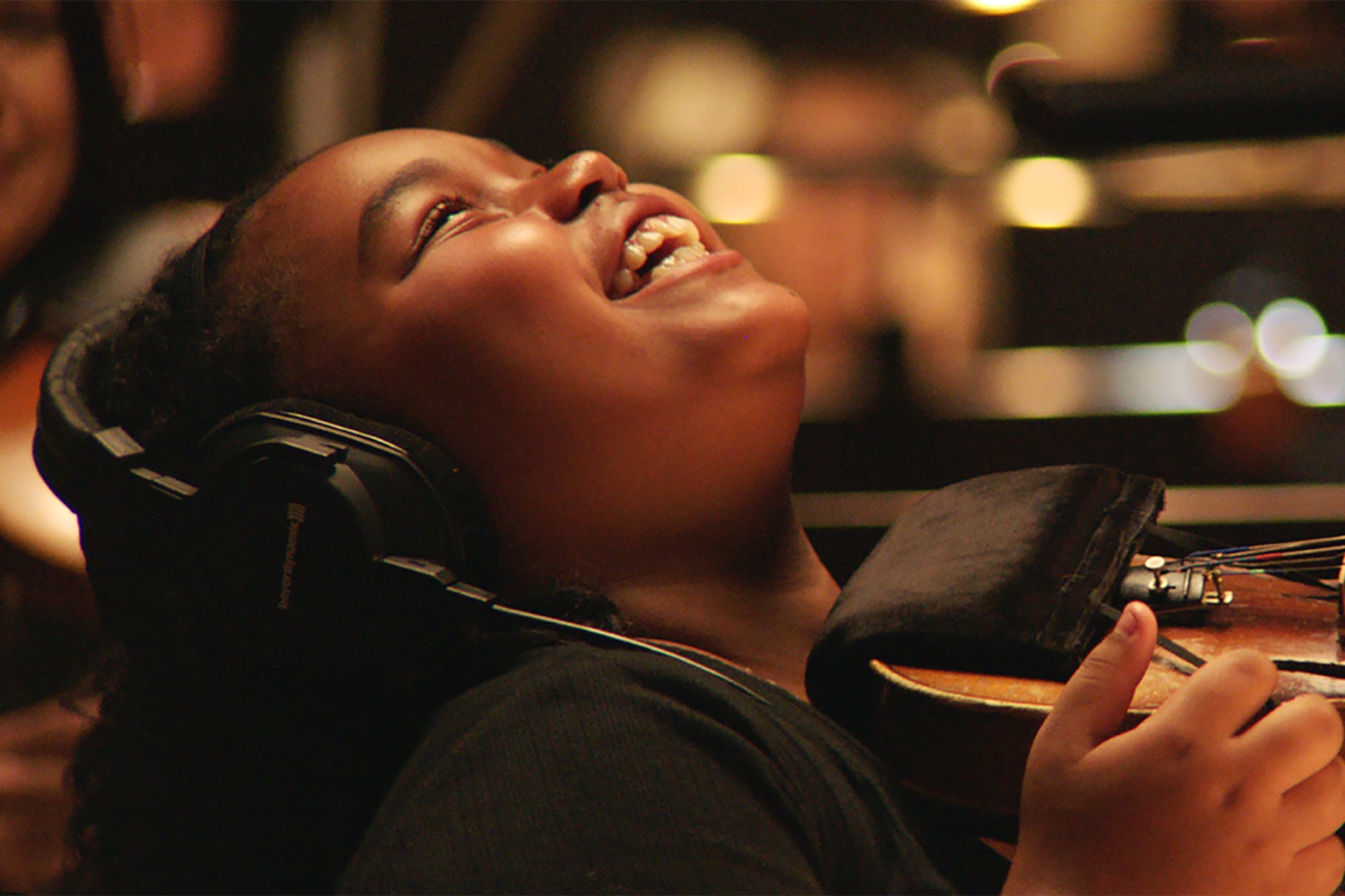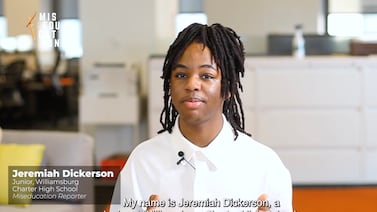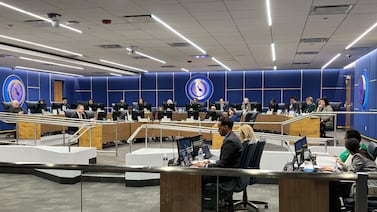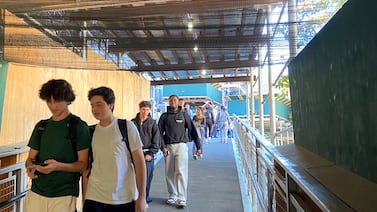Sign up for Chalkbeat’s free weekly newsletter to keep up with how education is changing across the U.S.
In the opening scene of “The Last Repair Shop,” a young girl with beads in her braids smiles at the camera. “I love the violin. … If I didn’t have my violin from school, I would probably, I don’t know what I’d do. Don’t even jinx me with that.”
The next scene takes us inside a violin, as a tool carefully moves along the wooden curves and an eye peers inside.
The Oscar-winning short documentary, directed by Ben Proudfoot and Kris Bowers, tells the story of the technicians who clean and repair more than 100,000 instruments for the Los Angeles Unified School District. The school district serving more than 400,000 students aims to have a music teacher in every elementary school, provides free instruments to all students enrolled in music programs, and operates its own repair shop. It’s one of the last operations of its kind in the country.
Bowers is a composer who has scored films such as “The Green Book” and “King Richard.” He’s also a graduate of LAUSD. He was exposed to music early and started playing the keyboard before he even entered elementary school. But the piano in the school auditorium was still important.
“I just remember during recess or lunch, if there was a moment that I had free, more often than not, I would find that piano and try out new ideas or things that I was learning,” he said. “I hadn’t thought about who fixed those instruments when I was a kid. I just showed up and the piano was in tune.”
The 40-minute documentary features interviews with young musicians talking about their instruments and technicians from each of the four shops — brass, string, woodwind, and piano — sharing their life stories, mixed with close-up shots of the instruments and the repair work bathed in golden light.
Chalkbeat spoke to Bowers and Paty Moreno, who repairs brass instruments, about the work, the instruments, the music, the students who make it, and more.
This interview has been edited for clarity and length.
In the film we see the stories of the people who work in the repair shop interspersed with kids talking about what their instruments mean to them. We don’t get a lot of exposition about the program, how it works, how it might be unique. What was driving that choice to present the story that way?
Bowers: Starting with the people first and foremost and having that be the core of the story was a big North Star for us. As soon as we have these individuals being open and vulnerable enough with us to share their lives and share their stories, that’s going to be the thing that draws people in.
This job is about catalyzing the conversation, right? Our hope is that this film touches people on such a deep emotional level, that they’re then driven to walk away from the film and say, “How does that work? Where is this? Does my city have this? What happened?”
I think that putting too much of the explanatory context of how this system works would take away from the immediacy of the emotional connection we have with these people.
What were you trying to evoke with the title, The Last Repair Shop?
Bowers: All of these major cities that have billions of kids and even cities that are known for music, they don’t have a program like this. It felt like not only something to be really proud of, but also at the same time a call to action that this can’t be the last one. There’s a feeling of concern for the scarcity of this type of program.
Paty, one thing that’s really delightful in the movie is your treasure jar. Tell us a little more about the types of things that you find inside instruments and why you decided to keep them.
Moreno: I was working in the private sector in a music store for seven years, and it never occurred to me that the kids can put objects inside the instruments. And when I started working for LAUSD, I noticed that the instruments were coming in, and they were saying, “It doesn’t make any sound.” And then when I would start checking the instrument, they were having different objects inside, even pencils in the leadpipes or erasers, toys, batteries. I found a little rock inside a piston.
For me it was like, “OK, you send me an instrument like that as a challenge. I will try to fix it.”
I just started with a very small jar. And I started putting whatever I was finding in it. And it got to be more and more because I’ve worked downtown 19, 20 years. When I retire I’m going to keep them and I take them as my trophy, as my treasures, so that’s why I started calling them the treasure jar.
Sometimes we hear this as a reason we can’t give kids instruments for free or that we can’t let them take instruments home. When you’re working on an instrument where maybe a child was not as careful as they should have been, what are you thinking about when you’re repairing that instrument?
Moreno: It’s not for me to judge the kid. A lot of times we have these moments in our lives where we get frustrated, and we don’t know what the feeling is for a kid. I don’t know what’s going on in their lives.
So yeah, when an instrument comes to me and I can see that it has been abused, I just try to do my best to repair it and put it back together and hopefully the instrument has a little bit more care and tenderness next time.
One of the other things that you talk about in the film is how much you struggled when your kids were younger. It made me think about the role that school districts play as employers in communities. How did your life change when you came to work in the repair shop?
Moreno: I don’t live in L.A., and the school district where my kids went to school, the music program and everything [needed] to be paid for. So that’s the reason why unfortunately, when my kid asked me if he could join music, I [said], ‘No, you can’t,’ because I [didn’t have] the means to do it. When you have only one income and when you make less than minimum wage, it’s very difficult.
And when I started working for the school district, that changed, because they give me a full time [job], they give me benefits, they give me more flexibility. I was able to stay home and take care of my sick kid, which some other places where I didn’t have those benefits, I couldn’t do it.
But I want people to know that everything we do is for the love of our kids, not only my kids now, but for the love of the kids that play the instruments. We do everything based on hopefully they grew up to have a better chance than what I have.
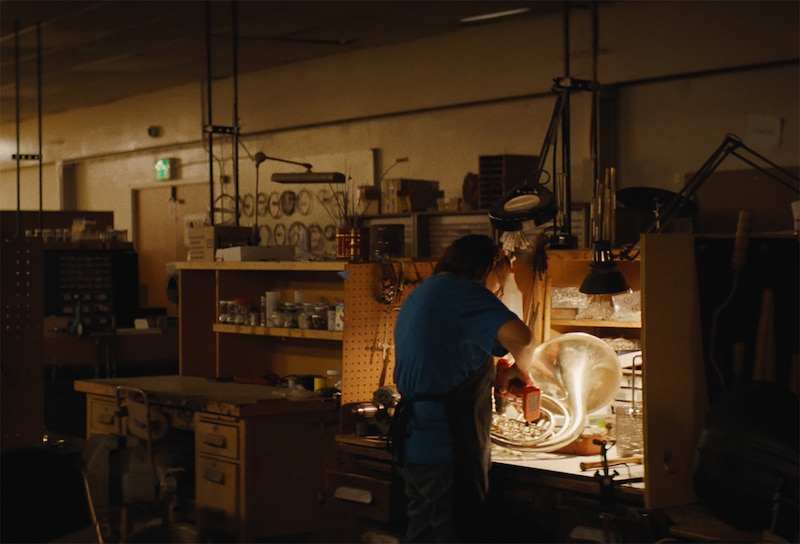
There’s an incredible performance at the end, where you have kids who are students currently in the program, and you have people who graduated decades ago and have made their living in the music industry. What was involved in putting that together?
Bowers: One of the things we were so struck by is this separation between these amazing craftspeople and the students that they’re impacting. We talked pretty early on about the idea of filling a room with generations of humans who have benefited from this repair shop.
Ben and I went to work on the piece of music, which was a lot of fun in our collaboration. I wrote a [first] pass of the piece of music, and then we listened to it and we visualized what we wanted the film to look and feel like. OK, the opening notes should be a little bit longer because we want a pullback shot.
The continuation of this outpouring of love was so emotional. All of these incredible musicians talking about the fact that they were going to donate their time, and making connections that this person went to the same school as this person, 10 years apart, and to have a young, middle school cellist sitting next to someone that played on half of the films that came out this year or someone that played on “Jaws” ... it was just an amazing day to be part of.
What was it like to see the shop and yourself and your colleagues on film and to see just a few of the kids whose lives you’ve touched?
Moreno: I always work with the instruments, I don’t have much interaction either with band directors or with the students at all. I feel very honored now that I met some of the kids. They helped me to raise a family myself.
I have seen those kids and how well they play and how professional the band directors are when they do the performances. I’m proud thinking how many kids really make it with music for their own passion, for their own life or their own living. I feel very proud to see how successful the kids are in the school district.
Editor’s note: This story and headlines have been updated to reflect that “The Last Repair Shop” won best short documentary at the Academy Awards Sunday.
Erica Meltzer is Chalkbeat’s national editor based in Colorado. Contact Erica at emeltzer@chalkbeat.org.

